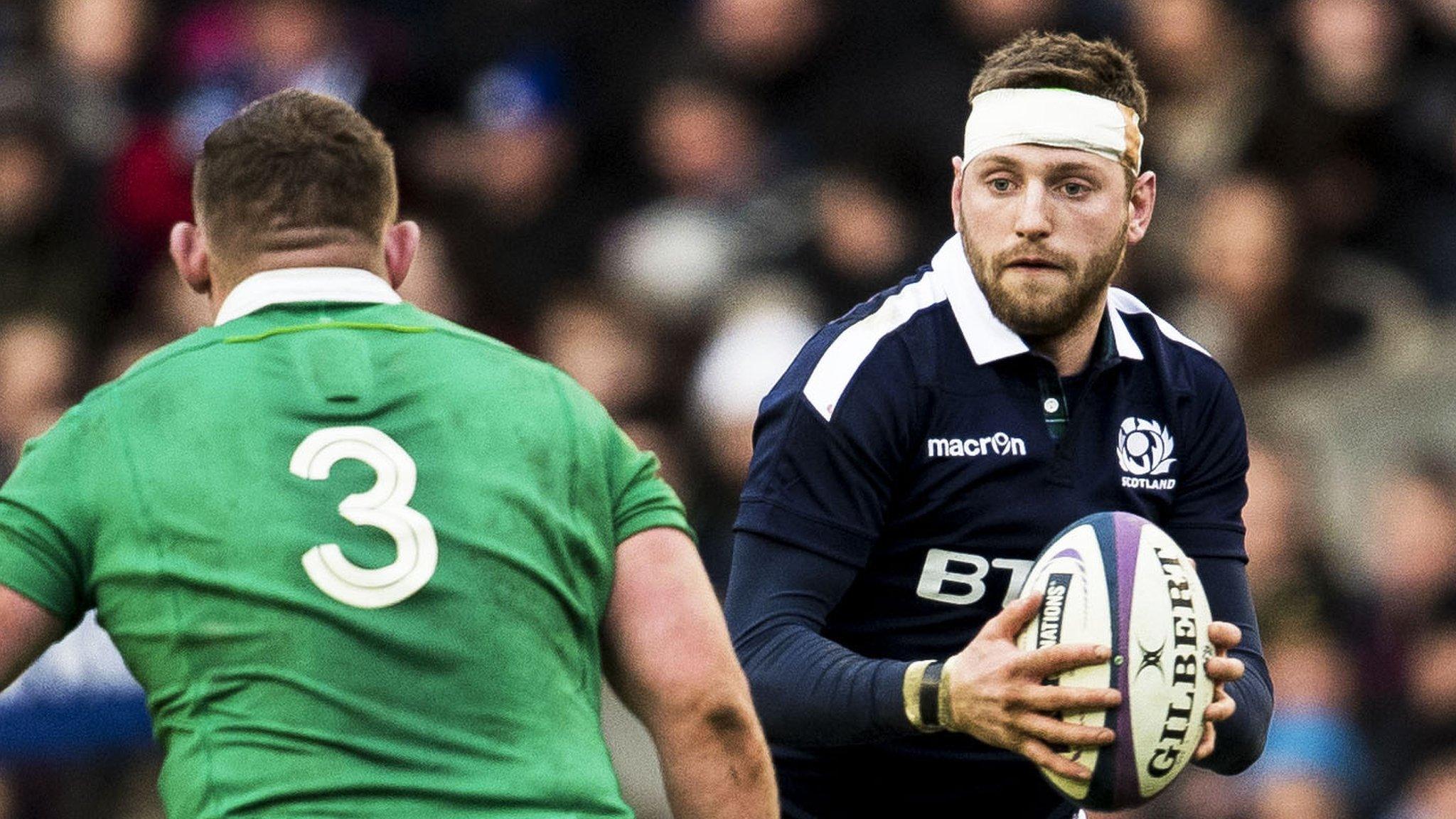Six Nations 2017: Wily Greig Laidlaw targets Scottish triumph in Paris
- Published
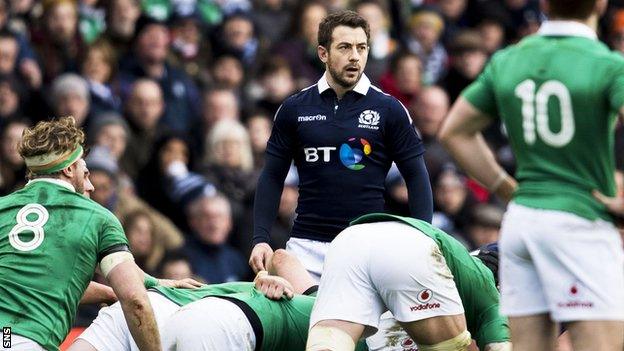
Greig Laidlaw will try to steer Scotland to back-to-back wins in this year's Six Nations championship in Paris on Sunday
Six Nations: France v Scotland |
|---|
Venue: Stade de France, Paris Date: Sunday, 12 February Kick-off: 15:00 GMT (16:00 local) |
Coverage: Watch live on BBC television, BBC Sport website & app. Commentary on Radio Scotland, Radio 5 live Sports Extra; Live text commentary on BBC Sport website. |
Bill Johnstone, doyen commentator for BBC Scotland rugby, tells a story about Greig Laidlaw from back in the day when Bill was head of PE at Jedburgh Grammar School and Greig was his pupil, the wee-est of wee guys, determined to make his mark.
"As a lad, he used to come to me ask how I'd make him taller. I used to say, 'Greig, I can't make you taller, but I can make you wider and broader like a pocket battleship'.
"Over the years when I've seen him up at Murrayfield, he always comes and says hello and I think, 'Yeah, you've become a pocket battleship, my son. Well done'."
You want to talk about long roads? Well, here you are. Before Saturday's win over Ireland, Laidlaw had played 25 Six Nations games and had won only five - three of them against Italy. In five years of championship rugby the only games he won that he wasn't expected to win was Ireland in 2013 and France 2016. Everything else, bar those Italy matches, were a mixture of disappointment and angst. Mostly angst.
Despite what happened on Saturday - a hit job on one of the world's best teams - you could drag the Scotland captain to the highest rooftop and yet his feet would still be planted on the ground. He's measured, focused, hard-bitten. Excited, for sure, but cool at the same time. It's one win, he says. Just one win.
"The next thing - backing it up"
You'd need to eat up a lot of road to find somebody who cares more about rugby than Laidlaw. It's a game that's thrilled him and tormented him. As captain of Scotland he's taken more than his share of blows - the late sucker-punch against Italy at Murrayfield in Vern Cotter's first year, the shut-your-eyes despair of the World Cup quarter-final against Australia and then the repeat in the autumn that made you wonder if Scotland would ever develop that killer instinct, that capacity to close out games that they've done enough to win.
And then Argentina came - a test passed. Peace-time rugby, though. "I'd agree with that," he says. "From November to the Six Nations is a different beast. If that (the Ireland comeback on Saturday) had happened to us before, we probably would have lost that game. The record tells you that.
"We believe we're changing but we're not shouting about that. The key is to back it up. It's the next step for this team."
International players talk about the little moment of solitude after a major victory, the scene in the quiet of the dressing room where they sit with their team-mates, spent but happy, and there's nothing that can compare with it. It doesn't last long. The reality of another upcoming battle barges in on their thoughts soon enough, but in those carefree minutes before the mind starts to race again, it's bliss. And that's how it was on Saturday.
2016 Six Nations Highlights: Scotland 29-18 France
"You sit back in your seat, take a breath and think, 'Oh, happy days'. It's just relief and then it's enjoyment and you get to experience it for a small time and then it's France. You're thinking about what's next. And that's the way it should be.
"We know we're not successful on the back of one game, but this team is learning to adapt to different situations. We're learning how to win tight games. As captain, I'm learning that we're resilient, I'm learning that there are more players round about me now that I can turn to for leadership."
Laidlaw spoke of many players but reserved comment for the two props, the 24-year-old loosehead, Allan Dell and the 21-year-old tighthead, Zander Fagerson. They had a torrid time in what few scrums there were on Saturday, but their work in the loose was outstanding.
"They're strong, strong boys. It was a good Irish scrum but we fixed it. And their work around the field, we're not playing with extra back-rows, but it's not far off it. Delly is excellent around the field. He gives lots of extra things.
"Zander? For a young lad to have to play for 80 minutes and still be getting off the line and making tackles and carrying right to the end is a credit to him."
"French? Un peu. It's going in one ear and out the other"
Anybody who has ever played for Joe Schmidt will tell you about his obsession with detail. If one of his players goes to the toilet, Joe will tell you how long they were in there and how quick their line speed off the bowl was, to the millisecond.
A narrative is built up around successful teams. We hear about their cosmic preparation because we want to know how winning teams are created. We don't tend to ask how the others do it. But the others, Scotland, are every bit as obsessive. It's just that the light isn't shone as brightly upon them.
It's not often that Schmidt gets out-analysed, but he did on Saturday. And it was his big mate, Cotter, and his wider coaching team who orchestrated it. The work they put in, the detail they went into, was key.
The vibe after the weekend was that Scotland may have taken inspiration from how Argentina beat Ireland at the World Cup, exposing their narrowness in defence at the breakdown and then stripping them out-wide.
Scotland in the 2017 Six Nations |
|---|
Saturday, 4 February: Scotland 27-22 Ireland |
Sunday, 12 February, 15:00 GMT: France v Scotland |
Saturday, 25 February, 14:25 GMT: Scotland v Wales |
Saturday, 11 March, 16:00 GMT: England v Scotland |
Saturday, 18 March, 12:30 GMT: Scotland v Italy |
They didn't. The focus was largely on the two games they played against New Zealand in the autumn - the historic victory in Chicago and the honourable defeat in Dublin.
"We tried to understand why New Zealand lost the first one and why they won the second one. They were the two main ones we looked at it.
"New Zealand made a lot of errors in America and Ireland made minimal errors. When you're playing against this Irish team you can't be loose. You just can't be. They're a fantastic team, but we studied them really hard.
"We looked at their backline and felt we were bigger and stronger, especially in the centre with Alex (Dunbar) and Huw (Jones). Garry Ringrose is not the biggest guy and we really felt we could power-up in the backs and run lines into Paddy Jackson and we did that and they tightened up a little bit, so we were able to subtly shift the ball wide. They came back at us, but we hung in there and dug it out. I thought we deserved to win."
We drag Laidlaw back to Saturday, but France is his focus now. He's moving there in the summer - Clermont's new scrum-half. That's Clermont - second in the Top 14 right now, first seed in the Champions Cup quarter-finals and supplier of six of the French starting team that played England last weekend.
How's Laidlaw's French? "Un peu. It's going in my right ear and out my left, but I'm trying."
In France's attempt to better themselves we see something of Scotland - big games lost that they might have won. Their last three games under Guy Noves? A two-point loss to Australia, a five-point loss to the All Blacks and, last Saturday, a three-point loss to England.
"You can't just run straight into the French"
"They're getting better," says Laidlaw. "Mark my words, this is a very dangerous rugby team and we can't be loose. If you're loose against this lot, they sniff it. We need to play a really smart game.
"No matter where you look they've got strength up front (the relentless captain Guilhem Guirado of Toulon at hooker, the terrific new La Rochelle blindside Kevin Gourdon and Northampton's force of nature Louis Picamoles) and real danger out wide on the wings. Clever players in around nine and 10 as well.
"You can't just run straight into the French. You run straight into the defence then you get slow ball and slow ball is hard to play off. Be smart around the attack, get quick ball, move them around. We'll be fitter than them. They fade. The Top 14 is definitely slower. Speaking to Richie (Gray of Toulouse), it's a slower competition, so we need speed in the play and we need skill to be able to do that."
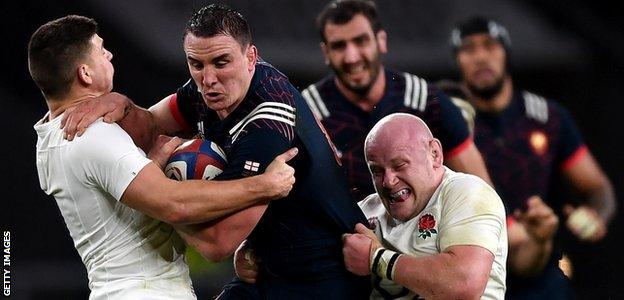
Scotland will be aware of the ball-carrying might of France number eight Louis Picamoles
This issue of France's fitness is an interesting one. In the last year the French have played 11 Tests - four wins and seven losses - and have failed to out-score their opponents in the second half in eight of them.
Scotland haven't won at Stade de France since 1999, of course. They've had their chances, though. In 2001 they were within a converted try until the last kick, in 2005 they led until three minutes from the end, in 2009 there was only six points in it with nine minutes left and in 2015 Scotland trailed by just four points with 77 minutes on the clock.
"We understand where we came from and we understand where we are now. It's always about the next game. We're going over there confident but we know what France are capable of. They're going to start winning very soon."
The challenge is to delay the renaissance for one week longer.
- Published8 February 2017
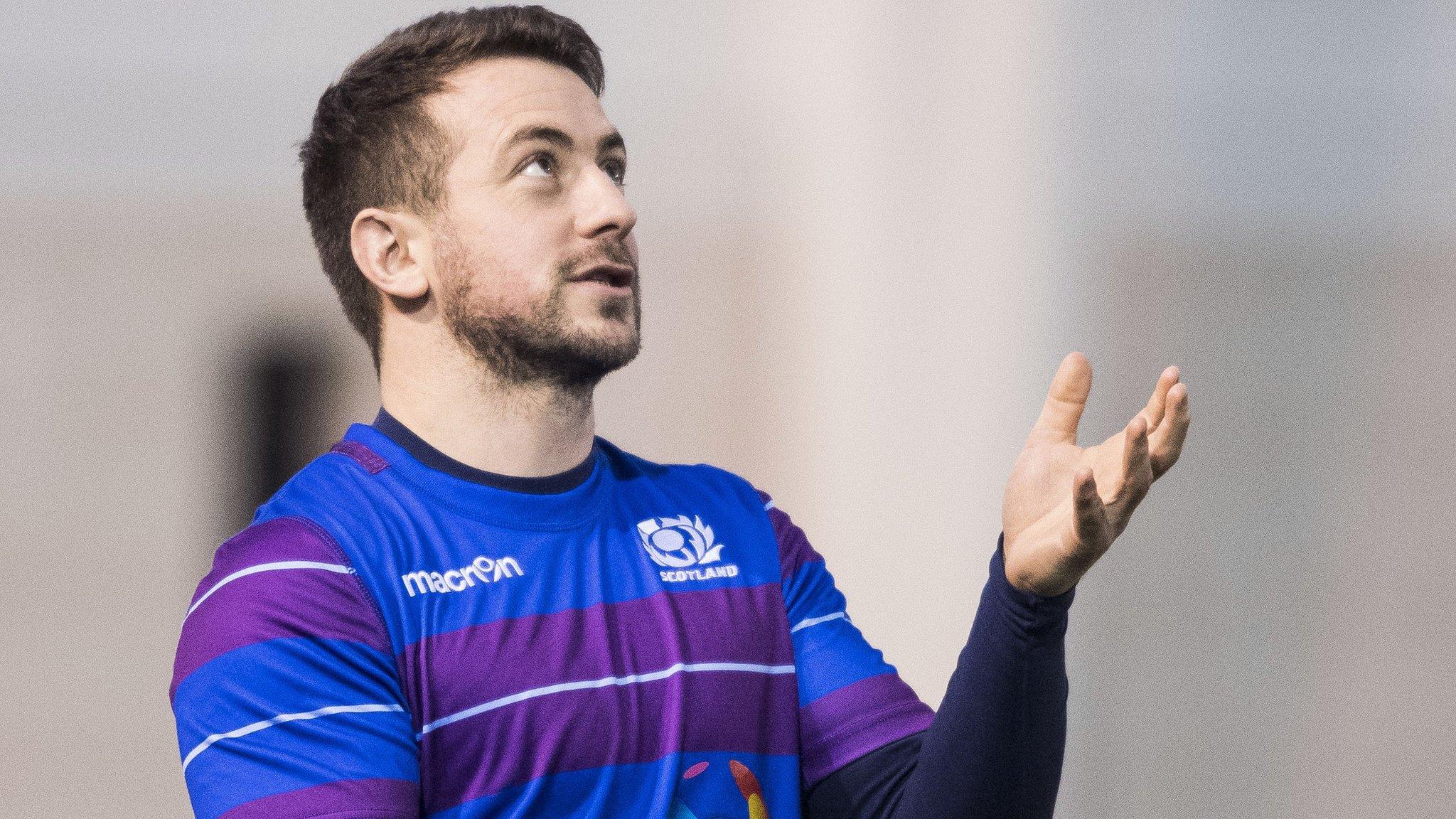
- Published11 February 2017
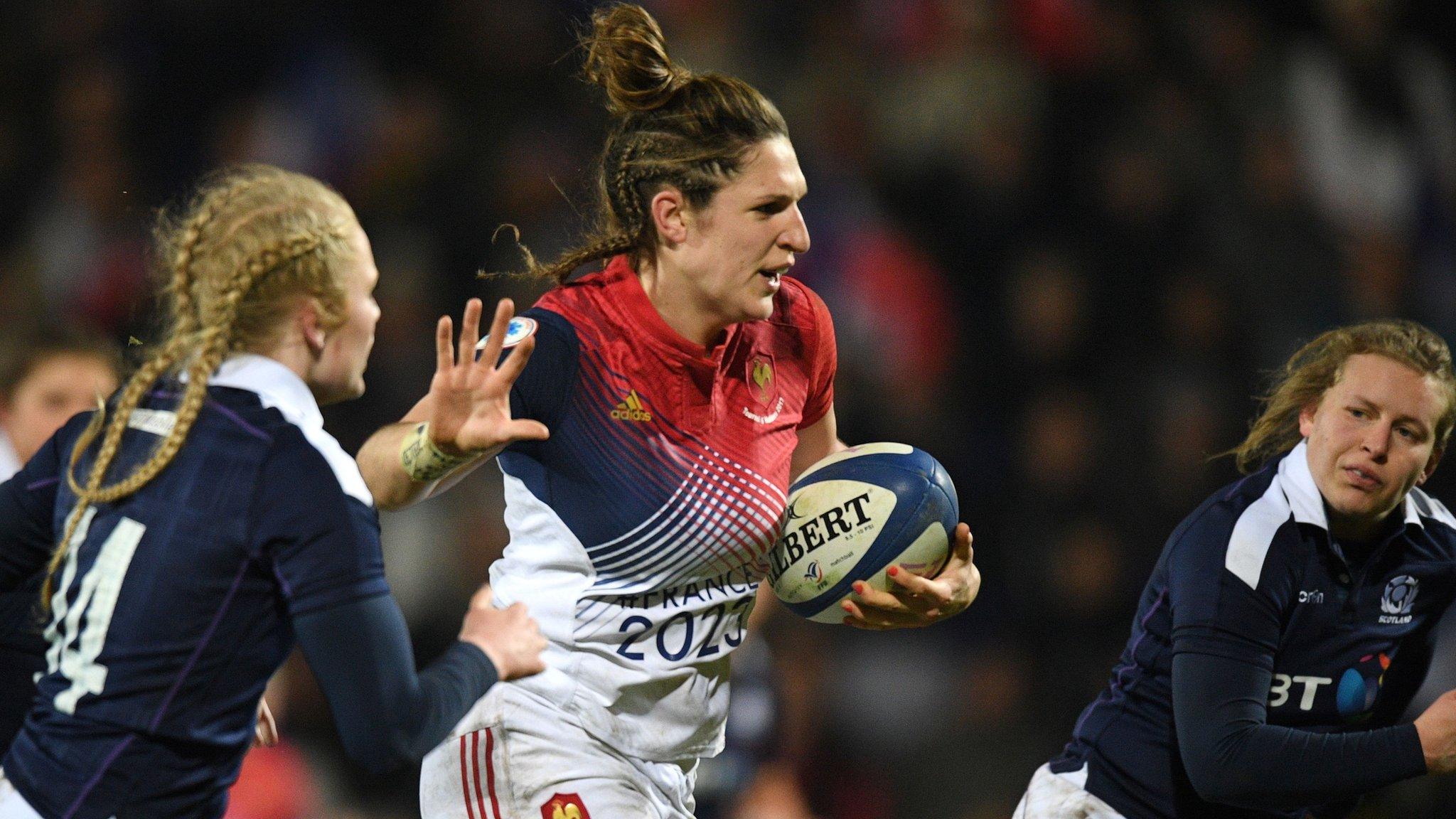
- Published7 February 2017
